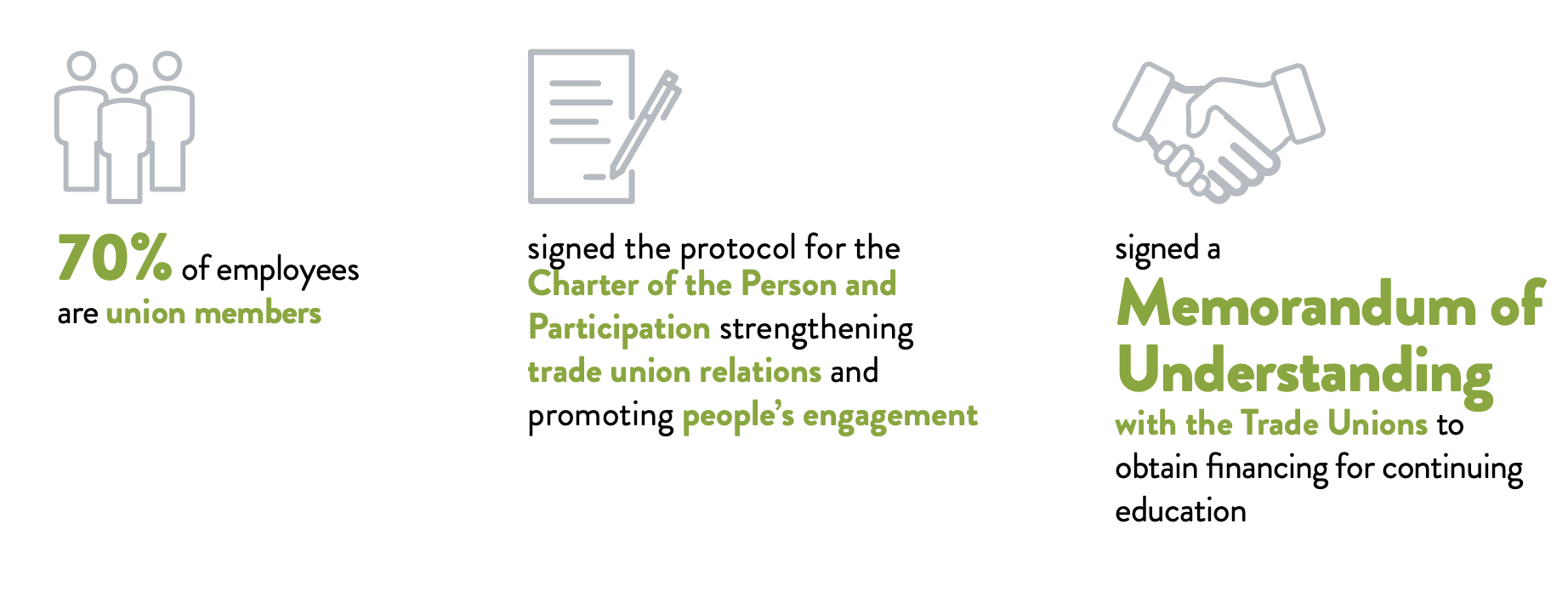Labour-management relations

Acea applies the Single Contract for the electricity sector and the Single Contract for the gas-water sector. All the workers are therefore covered by national collective bargaining agreements.
In 2023, unionisation was around 70% and 232 employees held management or trade union representation positions, of which: 19, appointed following an agreement, were Workers’ Representatives for Safety and the Environment (RLSAs) and 6, appointed following elections, were Unitary Trade Union Representatives (RSUs) for the company Acea Ato 5.
Within the People Culture & Organization Department of the Parent Company, the Industrial Relations Unit oversees the company’s policies regarding trade union relations, ensuring consistency with the Group’s objectives. The discussions on the specific corporate requirements are conducted within the framework of national collective bargaining (CCNL) at the sector level, and between companies and internal employee representatives.
Acea has a worker consultation procedure, whether direct or through their representatives, with reference to issues such as workplace safety, respect for the environment and the sustainable development of production activities. There are also Bilateral Commissions, composed of company representatives and employees, who express their opinions on issues such as training, remote working, corporate welfare and occupational health and safety and participatory models, such as Unitary Trade Unions (RSU) and Workers for Safety and the Environment (RLSA).
CHARTER OF THE PERSON AND PARTICIPATION
The Charter of the Person and Participation is intended to develop and grow professional skills within the company and support individual and collective well-being, investing in the abilities and skills of our people, supporting quality and employment stability, also to create value for the local area and the social/economic structure, improving the quality of the services provided.
There are many initiatives included, including verifying and developing professional skills within the company, internalising activities carried out through contractors, developing co-designed training courses, projects to modernise working spaces, the introduction of training and parenting measures that go beyond regulatory requirements as well as finding solutions to optimise working hours. Additionally, bilateral bodies have been established with the trade unions, including the Bilateral Inclusion and Equal Opportunity Committee, the Bilateral Welfare Committee and technical round tables for contracts and optimising working hours, as well as the Observatory on Training, Health and Safety and the Observatory on professional retraining.
In April 2023 a draft agreement was signed with the trade unions to adhere to the financing envisaged for the National Joint Inter- professional Fund for continuous training in the industrial public services, “Fonservizi” and a training plan known as “Horizon 2” was activated for the period from May 2023 - April 2024.
In July 2023, an agreement was reached defining the profit and productivity indicators for the payment of the Performance Bonus for the year, which confirmed the disbursement of an additional payment above the maximum salary payable, equal to € 200, destined for the Pegaso contractual Complementary Social Security Fund.
Finally, in October 2023, implementing the commitments made in the Charter of the Person and Participation, three agreements were reached:
- the innovative Protocol on Tenders, to guarantee the highest
levels of legality and efficiency in managing tenders, supporting transparency and competition, strengthening workplace health and safety protections and increasing verifications with refer- ence to the regularity of tenders in terms of reference regulations (see also the Suppliers chapter); - the Agreement to standardise working hours for personnel working for the company, calling for the adoption of a 38 hour work week, instead of 38 hours and 30 minutes, with the goal of promoting the qualitative conception of work and improving work/life balance;
- the Agreement to internalise reception services at Acea headquarters.
As regards the information notice to the employees regarding possible organisational changes or corporate reorganisations that eect employment relations, Acea takes different positions depending on the situations explained below:
- organisational changes: in the event of establishment of new Units or changes in assignments or responsibilities, the People Culture & Organization Department issues an Organisational Provision and sends a communication to the competent functions, which post it on the bulletin board and the company intranet. In the event of organisational changes that affect the staff, the trade union representatives are informed. If they concern a single employee (change in workplace, schedules, etc.), s/ he in informed by the structure responsible for human resources within the relevant company;
- Corporate reorganisations: in the event of reorganisation, as a result of significant organisational and production changes, with effects on working conditions and employment, the methods of informing the employees and the Trade Union Representatives, are regulated by the CCNL applied in the Group and by the Labour-Management Relations Protocols;
- corporate transformations (such as alienations, mergers, acquisitions, transfers of company branches): in cases of corporate transformation, the notices to the employees are regulated by the legislation in force142, which anticipates information obligations towards employees that allows them to verify the business reasons for the transactions, the correct methods of the process and the consequences on the employment relationship.
IL CONTENZIOSO CON I DIPENDENTI E CON I SINDACATI
The labour disputes mainly concern dismissals, classification changes, dierences in remuneration, indemnities not received, demotions, and employment relationships.
In 2023 there were 16 new labour disputes (24 in 2022). A total of 59 labour disputes were pending as at 31 December 2023 – including those initiated in previous years. There are no trade union disputes.
142 Article 2112 of the Italian Civil Code and Article 47 of Law 428/90 as subsequently amended and supplemented.